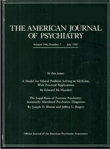Specificity of the DST and the TRH test for major depression in alcoholics
Abstract
The authors examined dexamethasone suppression test (DST) and thyrotropin-releasing hormone (TRH) test results in 32 chronic alcoholics without depression or hepatic disease to see if alcoholism alone might lead to positive test results. After 3 weeks of sobriety there were no DST abnormalities, but blunted TRH test results were observed in eight of the 32 alcoholics. More of the 15 patients also tested during alcohol withdrawal than of the 20 normal subjects or the 32 alcoholics without alcohol withdrawal had DST and TRH test abnormalities. When performed after 3 weeks of sobriety, the DST but not the TRH test has potential as a specific laboratory adjunct in the diagnosis of depression in alcoholics.
Access content
To read the fulltext, please use one of the options below to sign in or purchase access.- Personal login
- Institutional Login
- Sign in via OpenAthens
- Register for access
-
Please login/register if you wish to pair your device and check access availability.
Not a subscriber?
PsychiatryOnline subscription options offer access to the DSM-5 library, books, journals, CME, and patient resources. This all-in-one virtual library provides psychiatrists and mental health professionals with key resources for diagnosis, treatment, research, and professional development.
Need more help? PsychiatryOnline Customer Service may be reached by emailing [email protected] or by calling 800-368-5777 (in the U.S.) or 703-907-7322 (outside the U.S.).



